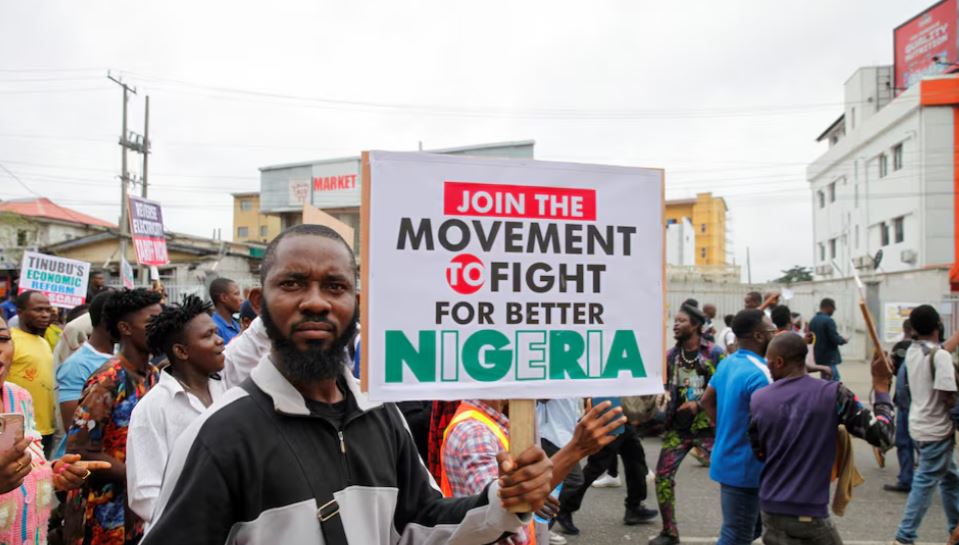Introduction: Nigeria’s Escalating Economic Crisis and Protests
In Nigeria, the ongoing economic crisis has sparked a wave of public protests, now entering their third day. Amid escalating tensions and clashes with security forces, President Bola Tinubu has made a heartfelt appeal for the cessation of demonstrations. His call for calm comes as the country grapples with significant economic challenges and widespread discontent among citizens.
The Call for Calm and Dialogue
President Bola Tinubu, addressing the nation in a televised broadcast on August 4, 2024, has urged for an end to the protests that have erupted across Nigeria. These demonstrations are driven by widespread frustration over the rising cost of living and perceived government mismanagement. Tinubu’s appeal marks his first public statement since the unrest began, highlighting his commitment to engaging with the citizens’ concerns.
In his address, Tinubu acknowledged the pain and anger fueling the protests. He assured Nigerians that the government is prepared to listen and address the grievances of its people. The President’s call for dialogue is seen as a critical step towards de-escalating the situation and restoring stability.
Economic Hardship and Protest Causes
The protests have emerged as a direct response to the severe economic hardship faced by many Nigerians. Demonstrators are demanding reductions in petrol prices and electricity tariffs, reflecting widespread dissatisfaction with the current economic policies. President Tinubu’s administration, which has been in office since May 2023, has implemented several controversial economic reforms, including the partial removal of subsidies and the devaluation of the naira.
These reforms, according to Tinubu, are essential for correcting years of economic mismanagement. Despite his defense of these measures, the economic strain on ordinary Nigerians has intensified, fueling widespread protests and calls for immediate relief.
Violence and Government Response
The protests have been marked by violence, with Amnesty International reporting at least 13 fatalities during the initial clashes with security forces. The Nigerian police have disputed these figures, acknowledging seven deaths as of Saturday. The reported deaths include casualties from an explosive device, a vehicular accident, and gunfire during incidents of looting.
In response to the escalating violence, Tinubu has emphasized the need for peaceful protest and constructive dialogue. He has urged protesters to avoid actions that could further destabilize the nation and hinder efforts to address the economic crisis.
Government Actions and Reforms
President Tinubu has highlighted several key initiatives undertaken by his administration to address the economic crisis. Government revenues have reportedly more than doubled to 9.1 trillion naira ($5.65 billion) in the first half of the year. Additionally, debt servicing has decreased from 97% to 68% of revenue, providing some relief for the government’s financial resources.
The administration is also focusing on infrastructure development, student loan schemes, and housing projects across Nigeria’s 36 states. These efforts are intended to stimulate economic growth and improve living conditions for Nigerians. Despite these measures, the immediate economic relief sought by the protesters remains a pressing concern.
Conclusion: Navigating Through Crisis
Nigeria’s current situation reflects a nation at a crossroads, grappling with economic hardship and widespread public unrest. President Tinubu’s appeal for an end to protests and his commitment to dialogue represent crucial steps in addressing the crisis. As Nigeria navigates this challenging period, the government’s ability to balance economic reforms with public sentiment will be vital in restoring stability and fostering national unity.
Summary
Nigerian President Bola Tinubu has called for an end to protests driven by economic hardship, urging dialogue to address public grievances. The ongoing unrest has been marked by violence and demands for economic relief. Tinubu’s administration has implemented various reforms and is working to improve economic conditions, but challenges remain.
Key Learning Points Table
| Key Learning Point | Details |
|---|---|
| President Tinubu’s Appeal | Urges an end to protests and calls for dialogue. |
| Causes of Protests | Driven by economic hardship and dissatisfaction with reforms. |
| Violence and Casualties | Amnesty International reports 13 deaths; police report 7. |
| Government Actions and Reforms | Increased revenues, reduced debt servicing, and infrastructure projects. |
| Need for Stability | Balancing economic reforms with public sentiment is crucial. |
Soumya Smruti Sahoo is a seasoned journalist with extensive experience in both international and Indian news writing. With a sharp analytical mind and a dedication to uncovering the truth, Soumya has built a reputation for delivering in-depth, well-researched articles that provide readers with a clear understanding of complex global and domestic issues. Her work reflects a deep commitment to journalistic integrity, making her a trusted source for accurate and insightful news coverage.



